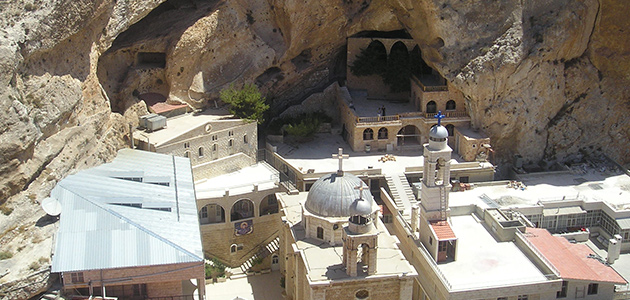13 September 2013
Maaloula
by Dr Philip Church
The other day I learned in an email from my friends at Middle East Concern (http://www.meconcern.org) that Syrian opposition forces had taken over the village of Maaloula in Syria. According to Middle East Concern
the troubles began early on Wednesday (4th September) with a suicide bombing at a government-held checkpoint on the edge of the village. Approximately ten people were killed. This was the first move in what appears to have been a coordinated assault by five armed groups fighting the government (including secular and extremist groups). The government forces responded and by Thursday afternoon the opposition groups had retreated from the village. However, the opposition groups mounted a second assault and by Saturday evening had gained control of the village. There were casualties amongst combatants from both sides. There have also been civilian casualties, including Christians.
The opposition groups gave assurances on Wednesday that church buildings would not be damaged, and these appear broadly to have been upheld during the initial assault. However, as clashes between the two sides intensified, claims have emerged of serious damage to at least three church buildings. A local Muslim leader spoke out against the attacks, but to no avail.
I went to Maaloula on a visit to Syria in 1996. It is a small, picturesque village about 40 km north of Damascus, and is a UNESCO world heritage site. It is built on the side of a hill, with the houses perched precariously there. Interestingly, many of the houses have crosses painted on the front, and I recall that one even had “Jesus saves” painted there. For Maaloula is a Christian village. More than that, however, it is a historic Christian village. It is home to the monastery of St Thecla (you can read about her in The Acts of Paul and Thecla - see my earlier blog on The New New Testament). The monastery is at the top of the hill, and part of the complex is what is believed to be the oldest Christian church in the world. It has been in continuous use since the second century. But that is not all. At Maaloula they speak Aramaic, the language of Jesus and his followers in the first century. Maaloula is a truly significant Christian holy place.

Bashar Al Assad is the son of Hafez Al Assad. His father ruled Syria for thirty years until his death in 2000, and Bashar has ruled since then. Another brother Bassel was the heir apparent, but he was killed in a motorcycle accident in 1994, so Bashar became president in his place. Prior to that he attended Damascus University from where he graduated as a medical doctor, and then went to London where he specialised in ophthalmology. The western media generally depict him as a “butcher,” but that is probably simplistic. He is more likely a puppet of his generals. The Al Assad family is Alawite, a moderate branch of Shi-ite Islam, while the rebels are from the majority, more radical Sunni Islam. The conflict is mainly tied up with this, and more radical Sunni Muslims would not even accept that the Alawites are truly Muslim. Of course, this is a very complex part of the world, and I am by no means an expert, but I do know that under the Alawite Assad dynasty, Syria has had a secular constitution, part of which includes “freedom of religion.” Of course freedom of religion does not mean that Muslims are free to become Christians; rather, it means that all people, Christians included, are free to practice their religion. Thus, Christian communities like that at Maaloula have thrived under the Assad dynasty. Apparently, for the last sixty or seventy years, Syria has been the easiest country in the Middle East to be a Christian.
But all that is likely to change. According to The Independent (http://www.independent.co.uk/news/world/middle-east/civilians-flee-rebels-retaking-christian-town-of-maaloula-in-syria-civil-war-8804032.html), most of the civilian population of Maaloula has fled since the rebels entered the town. The same news item from The Independent suggests that the rebel groups that have occupied Maaloula are linked to Al-Qaeda. These are the people that some western world leaders are supporting in this conflict.Only time will tell how events will unfold in the next few days, but, if as predicted, the US punishes the Assad regime with bombs, the Assad regime will no doubt be severely weakened and the rebels strengthened. If that happens I wonder what will happen to the historic Christian community in Maaloula.
The people at Middle East Concern tell us that Syrian Christians are asking us to pray for the situation in Syria, and they have given some points for prayer. I commend them to you. They are asking us to pray that...
- The bereaved, wounded and traumatised will know the healing touch of Jesus
- There will be effective provision for those displaced.
- Each area of Syria will be governed wisely for the benefit of all residents
- Calls for renewed effort to find a political solution will be heeded by all those in authority and with influence
- The international community will cease using Syria as a place to pursue their own agendas and act only in the best interests of the Syrian people.
